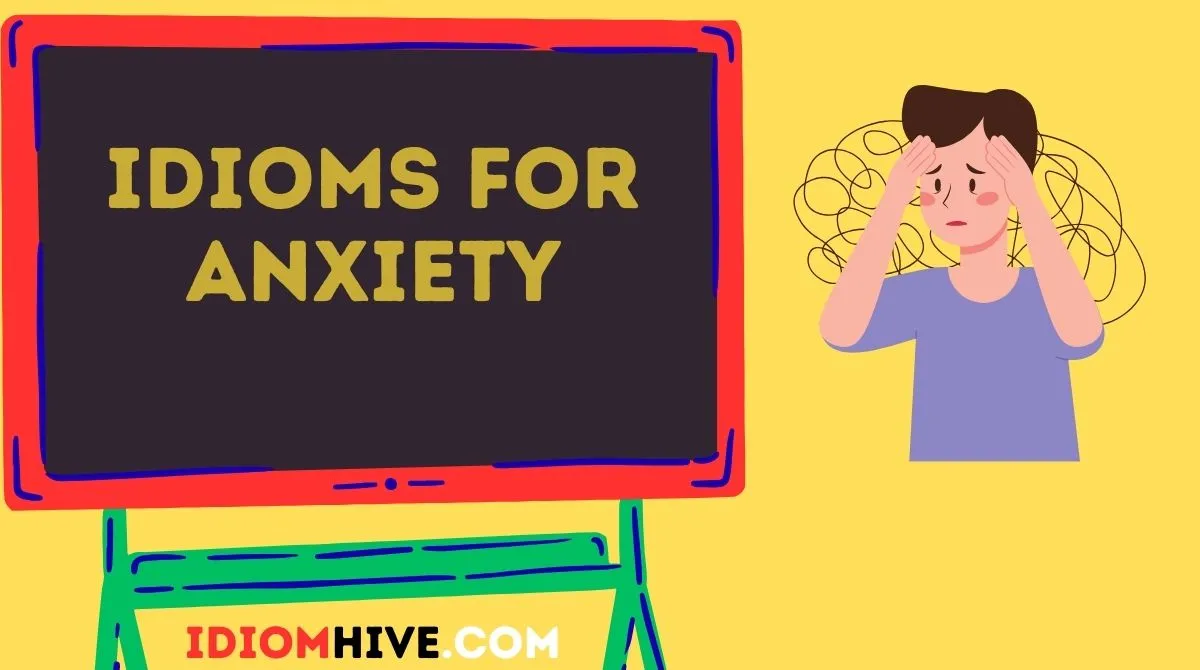Anxiety is a natural human emotion, and almost everyone has felt nervous, restless, or worried at some point. In English, idioms are often used to describe these emotions in vivid and relatable ways.
Idioms are phrases whose meanings are not always obvious from the individual words but instead carry cultural and figurative significance. They add color, depth, and emotion to language, making conversations sound more natural and engaging.
When talking about anxiety, idioms can help express feelings in ways that sound authentic. Instead of saying “I am very nervous,” you might hear someone say “I have butterflies in my stomach.”
Learning idioms for anxiety allows English learners to not only understand native speakers better but also to express their own emotions with creativity and confidence.
Whether in casual talks, storytelling, or even professional writing, these idioms make communication more powerful.
Did You Know?
The idiom “nervous wreck” first appeared in the late 19th century and was linked to the invention of the railway system. The idea was that a person overwhelmed by anxiety was as damaged as a train wreck. Since then, it has become one of the most popular idioms for stress and worry in English.
Common Idioms for Anxiety
Below you’ll find a collection of idioms that describe different shades of anxiety and nervousness. They are organized into groups to make learning easier.
Idioms About Physical Reactions to Anxiety
Butterflies in My Stomach
Meaning: Feeling nervous before an event.
Example: I always get butterflies in my stomach before giving a big presentation.
Similar Idiom: “Jitters.”
Note: Common in informal and daily speech.
On Edge
Meaning: Feeling tense, nervous, or irritable.
Example: She’s been on edge all week because of the exams.
Similar Idiom: “High-strung.”
Note: Used both in formal and informal contexts.
At the End of My Rope
Meaning: Running out of patience due to stress.
Example: After so many sleepless nights, I’m at the end of my rope.
Similar Idiom: “Fed up.”
Note: Frequently used in daily conversation.
A Bundle of Nerves

Meaning: Extremely nervous or anxious.
Example: He was a bundle of nerves before his job interview.
Similar Idiom: “Nervous wreck.”
Note: Informal, everyday usage.
Cold Feet
Meaning: Sudden fear that makes you hesitate.
Example: She got cold feet before the wedding and almost backed out.
Similar Idiom: “Second thoughts.”
Note: Common in both casual and serious conversations.
Shaky as a Leaf
Meaning: Trembling from fear or nervousness.
Example: He was shaking like a leaf while waiting for his test results.
Similar Idiom: “Quaking in your boots.”
Note: Informal, often used in storytelling.
Break Out in a Cold Sweat
Meaning: Sudden sweating caused by nervousness or fear.
Example: I broke out in a cold sweat before going on stage.
Similar Idiom: “Sweating bullets.”
Note: Informal, vivid expression.
Lose Sleep Over Something
Meaning: To worry so much it affects rest.
Example: She’s losing sleep over her upcoming exams.
Similar Idiom: “Tossing and turning.”
Note: Daily life, informal but clear.
Idioms About Fear and Worry
A Nervous Wreck
Meaning: Extremely anxious or upset.
Example: He was a nervous wreck before his wedding day.
Similar Idiom: “Bundle of nerves.”
Note: Informal, everyday usage.
On Pins and Needles
Meaning: Waiting anxiously for something to happen.
Example: I was on pins and needles waiting for the phone call.
Similar Idiom: “Holding your breath.”
Note: Often used in storytelling or conversation.
A Knot in My Stomach
Meaning: Feeling tightness in your stomach due to worry.
Example: I had a knot in my stomach before the big exam.
Similar Idiom: “Butterflies in my stomach.”
Note: Commonly used in personal storytelling.
Sweating Bullets
Meaning: Extremely nervous or worried.
Example: He was sweating bullets during the police interview.
Similar Idiom: “Break out in a cold sweat.”
Note: Informal, dramatic imagery.
Worry Wart
Meaning: A person who worries too much.
Example: Don’t be such a worry wart; everything will be fine.
Similar Idiom: “Overthinker.”
Note: Playful, informal, often for friends.
Jump Out of My Skin
Meaning: Extremely startled or scared.
Example: I almost jumped out of my skin when the door slammed.
Similar Idiom: “Scared stiff.”
Note: Common in daily life and stories.
Afraid of One’s Own Shadow
Meaning: Easily frightened, overly anxious.
Example: He’s so nervous he’s afraid of his own shadow.
Similar Idiom: “Scaredy-cat.”
Note: Informal and often humorous.
Chicken Out
Meaning: To lose courage and back out.
Example: He chickened out of asking her on a date.
Similar Idiom: “Get cold feet.”
Note: Informal, casual use.
A Heart in My Mouth
Meaning: Feeling extreme fear or anxiety.
Example: My heart was in my mouth when I heard the news.
Similar Idiom: “Panic-stricken.”
Note: Common in both spoken and written English.
Idioms About Stress and Tension
Walking on Eggshells
Meaning: Acting carefully to avoid upsetting someone.
Example: She felt like she was walking on eggshells around her boss.
Similar Idiom: “Tread lightly.”
Note: Used in work and personal contexts.
At My Wits’ End
Meaning: So worried that you don’t know what to do.
Example: I’m at my wits’ end trying to handle all this stress.
Similar Idiom: “Losing my mind.”
Note: Informal, strong emotional tone.
Bite Your Nails
Meaning: A nervous habit when anxious.
Example: She bites her nails before every test.
Similar Idiom: “Fidget.”
Note: Descriptive, daily life.
Tear Your Hair Out
Meaning: To be very anxious or stressed.
Example: He was tearing his hair out over the delay.
Similar Idiom: “At my wits’ end.”
Note: Informal, everyday usage.
Go to Pieces
Meaning: To lose emotional control.
Example: She went to pieces after hearing the bad news.
Similar Idiom: “Break down.”
Note: Informal, emotional contexts.
A Bag of Nerves
Meaning: Full of anxiety and restlessness.
Example: I was a bag of nerves before my first performance.
Similar Idiom: “Nervous wreck.”
Note: Informal, daily life.
Ants in My Pants
Meaning: Restless because of nervous energy.
Example: The kids had ants in their pants before the trip.
Similar Idiom: “Fidgety.”
Note: Informal, playful tone.
Under Pressure
Meaning: Feeling stressed by responsibility.
Example: He performs well under pressure.
Similar Idiom: “Stress out.”
Note: Common in professional and personal settings.
Idioms About Panic and Overreaction
Freak Out
Meaning: To react with sudden fear or panic.
Example: She freaked out when she lost her passport.
Similar Idiom: “Lose it.”
Note: Very informal, daily life.
Panic Button
Meaning: To react quickly and fearfully.
Example: Don’t hit the panic button; we can solve this.
Similar Idiom: “Overreact.”
Note: Informal, casual situations.
Lose Your Nerve
Meaning: Suddenly become too afraid to continue.
Example: He lost his nerve during the speech.
Similar Idiom: “Chicken out.”
Note: Informal, commonly used.
Scared Stiff
Meaning: Too frightened to move.
Example: I was scared stiff when I heard footsteps in the dark.
Similar Idiom: “Frozen with fear.”
Note: Common in storytelling.
Bite the Bullet
Meaning: To face a difficult situation with courage.
Example: I had to bite the bullet and talk to my boss.
Similar Idiom: “Face the music.”
Note: Semi-formal, common in work and life.
Hold Your Breath

Meaning: To wait anxiously.
Example: I held my breath as the results were announced.
Similar Idiom: “On pins and needles.”
Note: Informal, daily usage.
Goosebumps
Meaning: A shiver caused by nervousness or fear.
Example: Her speech gave me goosebumps.
Similar Idiom: “Shivers down my spine.”
Note: Common in storytelling.
How to Use These Idioms in Daily Life
- Speaking: Use them in casual conversations to sound natural. Example: “I had butterflies in my stomach before the interview.”
- Writing: Add them to personal stories, blogs, or creative writing to make your descriptions lively.
- Professional usage: Some idioms (like “under pressure” or “bite the bullet”) can even fit in formal settings such as meetings or presentations.
Common Mistakes Learners Make With Idioms
- Wrong Word Order
❌ I had in my stomach butterflies.
✔️ I had butterflies in my stomach. - Literal Translation
❌ He has ants in his trousers.
✔️ He has ants in his pants. - Overusing Idioms
❌ Using too many idioms in one sentence makes it confusing.
✔️ Balance idioms with clear language for natural expression.
FAQs
1. Why do we use idioms for anxiety?
Idioms help express emotions in a colorful, relatable way. They make communication feel natural and engaging.
2. Are idioms for anxiety formal or informal?
Most are informal, but some (like “under pressure” or “bite the bullet”) are also suitable for professional use.
3. Can idioms be used in writing?
Yes. They add richness to stories, essays, and blogs. However, avoid overusing them in academic writing.
4. Do native speakers use these idioms often?
Yes, especially in casual conversations, storytelling, and even workplace discussions.
5. How can I learn idioms faster?
Practice using them in sentences, connect them with emotions, and notice how native speakers use them in movies, books, and conversations.
Conclusion
Anxiety is a universal feeling, and English idioms give us vivid ways to talk about it. From “butterflies in my stomach” to “walking on eggshells,” idioms make conversations more natural, relatable, and expressive.
By learning these phrases, you can better understand native speakers and add color to your own speech and writing. Remember, idioms are not just about words—they capture emotions, culture, and daily life.
So next time you feel stressed, instead of saying “I’m nervous,” try using one of these idioms and see how much more powerful your English becomes.










